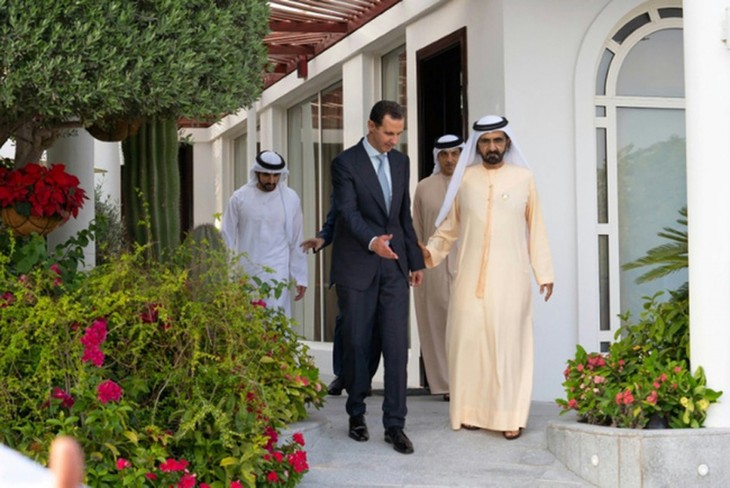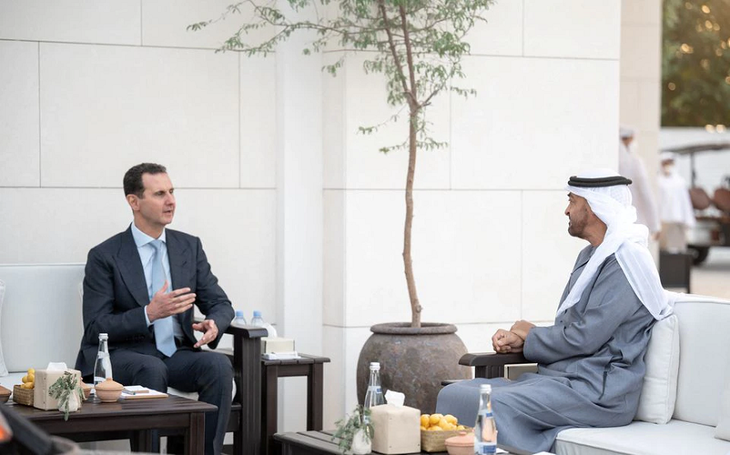(VOVWORLD) - Syrian President Bashar al-Assad paid an historic visit to the United Arab Emirates last Friday. It was the first official visit by a Syrian President to an Arab country in a decade, since 2011 when Syria erupted in a civil war and lost its membership in the Arab League. The visit marks Syria’s reintegration into the world and a new conciliation in the Middle East.
 Syrian President Bashar al-Assad visits the UAE. (photo: The Syrian President's Office) Syrian President Bashar al-Assad visits the UAE. (photo: The Syrian President's Office) |
President Assad’s visit to the UAE comes with the civil war in Syria not yet over and national concord not yet attained. With support from Russia and other allies, the Assad government has regained control of large parts of Syria's strategic regions, and has begun reconnecting with the world community and breaking its years-long isolation. Meanwhile, the UAE has shown its influence in connecting and conciliating former foes in the region.
Syria breaks isolation
During the Arab Spring, in early 2011, Syria began a bloody civil war. The Arab League suspended its membership some months later. Many Arab countries cut diplomatic ties with Syria, including the UAE in February 2012.
The government of President Assad has gradually regained control of the country and has begun to break out of its isolation. In December, 2018 the UAE reopened its Embassy in Damascus. In November, 2021 UAE Foreign Minister Sheikh Abdullah bin Zayed Al-Nahyan paid an official visit to Damascus and held talks with President Assad. Last October King Abdullah II of Jordan talked by phone with President Assad for the first time since the Syrian civil war began.
Syrian diplomacy has spread a message of conciliation and concord in the region.
After a meeting with Assad in Abu Dhabi, Crown Prince Sheikh Mohammed bin Zayed Al-Nahyan said he hopes Assad's visit will pave the way for peace and stability to prevail in the region.
 Syrian President Bashar al-Assad (L) meets Crown Prince Sheikh Mohammed bin Zayed al-Nahyan of Abu Dhabi on March 18, 2022 in Abu Dhabi. (photo: Reuters) Syrian President Bashar al-Assad (L) meets Crown Prince Sheikh Mohammed bin Zayed al-Nahyan of Abu Dhabi on March 18, 2022 in Abu Dhabi. (photo: Reuters) |
Major changes in the political situation
Analysts say that improvement in relations between Syria and other Arab countries carries meaningful messages in the context of the complicated regional and global geopolitical situation.
First, it confirms and continues the trend of concord and conciliation which has formed recently in the Middle East. For instance, Israel has signed three peace agreements with Arab countries, including the UAE in 2020; the tension since 2017 between Qatar and 5 other Arab countries has been resolved; and less confrontation and more dialogue has been occurring between Shiite Iran and Sunni countries like Saudi Arabia.
Second, it conveys a message of self-control and self-determination in the Middle East toward escaping the domination and influence of external powers.
After a meeting between the UAE Foreign Minister and the Syrian President in Damascus last November, the US said it won’t support any effort to normalize relations with or recognize President Assad. But the UAE and other Arab countries have insisted on opening their doors to Syria in the interest of regional conciliation. The geopolitical situation in the Middle East is changing. Peace and conciliation are being promoted and new opportunities have opened.